Spain’s Sado-Monetarism: Will It Lead to Revolution? – Part II
In the first part of the article, the author lists the austerity measures taken by the conservative Spanish government in the last months and points out their gloomy consequences on the already squeezed Spanish people. He then demonstrates how politicians are completely uninterested in the welfare of the people and how they are dominated by the cynical strategies of Capital and corporations, which are the real rulers of global economy. He explains how — through a psychological strategy called “learned helplessness” — Capital uses unemployment and low wages as a way to keep inflation low, keep the value of money high to have more purchasing power in the context of international finance and commerce, submit workers to a regime of insecurity and precariousness that makes them accept abuses in the labor context, creating a new form of slavery.
Spanish Civil War: a parallel
Between 1936 and 1939 over 500,000 people were killed in the Spanish Civil War that ended with the victory of the Fascist forces of Generalissimo Francisco Franco. The war is traditionally attributed to the following problems:
1) The gap between poor and rich, which caused a great discontent especially in a country led in a feudal way and where agriculture still represented the main branch of the economy.
2) Tensions between the new republican government and an army that was always eager to take power by force on the wave of its conservative claims.
3) Two important regions that wanted independence: Catalonia and the Basque region.
4) The Roman Catholic Church’s flirtations with the rich classes and efforts to maintain both its wealth and its control over Spanish politics and morality.
5) The economic depression of the 1930s that had hit Spain hard, making the prices for crops and prime exports such as olive oil and wine fall in a country whose economy, as we noted above, was based mainly on agriculture. Industry was also hit: iron and steel production fell, since nobody had the money to buy the products.
6) Unemployment rise in both agriculture and industry; wages suffered huge cuts.
Points three, five and six share striking similarities with the present situation. However, we might appreciate the increasing gap that the recession is reintroducing into the Spanish social structure (as in point 1). A considerable difference from the past could be individuated in the fact that the Spanish economy does not rely on agriculture so strongly now as it did in the 1930s.
The Italian Communist Antonio Gramsci—in line with Marxist-Leninist positions that considered industrialization and the birth of a bourgeois industrial class as a necessity on the path to a proletarian revolution—saw agriculture as a factor of backwardness and spoke about it in particularly harsh tones:
“In countries which are still capitalistically backward such as Russia, Italy, France and Spain, there exists a sharp separation between the city and the country, between workers and peasants. In agriculture there survive genuinely feudal economic forms, and a corresponding psychology. The idea of the modern liberal-capitalistic state is still unknown; economic and political institutions are not conceived as historical categories, which have had a beginning, have undergone a process of development, and which can dissolve, after creating the conditions for superior forms of social cohabitation: they are conceived instead as natural categories, perpetual, irreducible. In reality large ownership has remained outside free competition: and the modern state has respected its feudal essence, developing juridical formulae such as holding in trust, which maintain in fact the existence and privileges of the feudal regime. The mentality of the peasant has thus remained that of the servant of the soil, who revolts violently against the ‘bosses’ on particular occasions, but is incapable of thinking himself part of a collective (the nation for the owners and the class for the proletarians) and of developing systematic action and permanent revolt to change the economic and political relations of social existence.” [1]
Even if Spain’s economy is not based mainly on agriculture anymore, Gramsci’s criticism against a “large ownership” that has remained “outside free competition” may be fairly applied to the contemporary monopoly of corporations.
Neo-liberalism introduced a naive vision of economy and finance: according to this, only a free, deregulated market could be the perfect remedy against the greediness of a corrupt, sickly bureaucratic State and allow the full expression of creativity together with the highest levels of production. However, neo-liberalism has proved to be a fake since the fair competition that it glorifies is actually replaced by the market’s domination by a plutocracy of corporations. The gap between unemployed workers and the corporate power that exploits them reminds us exactly of the “feudal” system condemned by Gramsci.
Furthermore, even if his analysis seems to be too severe towards peasants, there is another aspect of it that is worth pointing out: the idea that “natural categories” superpose themselves to economic and political institutions.
However, in an article published by New Politics in 1986, Murray Bookchin insists on the same idea: [2]
“Above all, Spain was a land in which cultures were in dramatic transition between town and country, feudalism and capitalism—a nostalgic world that looked back to a past of aristocratic supremacy and forward to a future of plebeian egalitarianism that found its most radical form in a huge anarchosyndicalist movement. What made the Spanish working class so uniquely revolutionary, in my view, was its well-rooted ancestry in the countryside—in a relatively slow-paced, organic agrarian world that clashed sharply with the highly rationalized, mechanized industrial world of the cities. […]
“The intensity of this force-field was heightened by a Spanish heritage of strong sociability: urban barrios were actually intimate villages within the city, knitted together by cafes, community centers and union halls and energized by a vital outdoor public life that stood at sharp variance with the aristocratic mythos of the Spanish past and the hated Church which had abdicated all claims to public service. The elite classes of the country, so completely divorced from those who worked for them, were highly protective of the privileges conferred upon them by pedigree, status, and landed wealth, which often produced fissures as bourgeois parvenus began to enter a social terrain guarded for centuries by tradition and history.
“Accordingly, one always “belonged” in a deeply social, cultural, regional, class, and economic sense—whether it was to a part of Spain, to a hierarchy, a caste, a clan, an institution (be it the army or a union), and finally, to a neighborhood, village, town, city, and province, precisely in that order of loyalty.” [3]
Has the mentality in Spain changed from this description? We doubt it. The paragraph cited above seems still terribly current, and it is maybe this very same lack of unity between classes—in a country where social differences are still strikingly marked, and people are united in clans more than in a unitary movement fighting for the common good—that obstructs the formulation of revolutionary thought that could bring to effective action.
Political castration
On May 10, the Spanish conservative government partly nationalized the country’s fourth-largest bank, Bankia, raising anger in the exploited population.
Prime Minister Mariano Rajoy tried to make people believe the old fairy tale according to which rescuing banks means saving economy and jobs because it is the banks that allow the flow of the money needed to finance the new (and old) enterprises that give jobs to the people.
That’s false. Unemployment can be eliminated only by planning a complete renovation of the job market, creating new jobs in sectors that are not controlled by the banks, which are prone to serve their own interests instead of those of the people and the national economy; a renovation in which national economic planning is not racketed by the international global finance anymore, forbidding at last the monopolistic power of corporations to dictate their will over the state economy and politics. This is what was done in Iceland—nothing more, nothing less (it’s not a coincidence that the mainstream media—a true Orwellian tool of propaganda—never mentions this example: it would be too easy to imitate it and dismantle the monopoly of Capital). Also, unemployment can be gotten rid of by helping little businesses to start, not fat cats to eat them.
From a Freudo-Marxist point of view, we could explain the present state of things like this: Capital has been able to stifle our courage, to deform our idea of revolution into one of endless manifestations that end up into either police repression or a self-inhibiting farce.
By setting himself as the archetypical Father of the present cultural hegemonic climate [4]—I’m borrowing Antonio Gramsci’s terminology—Capitalism generates a schizophrenia in the psyche of the dominated classes: on the one hand, it awakens in the oppressed an Oedipal drive surging from the lack of power interiorized as the Lacanian “manque” or lack of Phallus; on the other hand, it stifles the Oedipal demands forcing them into obedience and submission. But the worst aspect of this psychosocial exercise of violence is the fact that, as in Orwell’s dystopian novel 1984, the archetypical Father has succeeded in taming our drives for freedom and dignity by making us introject the archetype itself and by making us believe that we love it, that it deserves respect, that in spite of all its defects it is the best ruler (Father) for all [5] so that we might not dare to stop it and return the violence it inflicts to us by trampling our basic rights.
The call for empowering the social Oedipal drive for justice—in order to overcome it and make justice triumph—appears insane to the present cultural hegemonic political correctness, not only because it offends the bourgeois puritanism, but because it is the only force that can blow on the embers of our claims, whose vitality is frozen by the capitalist system. Instead of living inside Orwell’s 1984, maybe we should start living inside another masterwork, Gustave Flaubert’s Sentimental Education. It would seem odd to cite such a book in an article about politics; however, in the plot of Flaubert’s masterpiece, it is right when Frédéric understands that his desperate, incestuous longing for Madame Arnoux—a maternal figure, an archetype of the Mother, the symbol of a freedom impossible to reach both because of social restrictions and because of the introjected auto-censure—leads to nothing that he suddenly gets involved in the political turmoil that surrounds him and that he refused to see: it is then that he develops a political conscience, that his private, self-centered longing becomes a political commitment, an active engagement in the fight for a better society. In this evolution lies the meaning of the “education” mentioned by the title.
Anthropologically, the horror for incest is usually explained as the need for a society to get out of its most narrow borders, to expand and not to be clustered in a clan. If Spanish people want to develop a successful, revolutionary, alternative movement that will be able to cut the tie with which the political and economic élite is strangling them, they must make their Oedipal side grow into a broader conscience that is not the one of a clan:a social, regional, class clan. If they won’t take this step, not only won’t they be able to perform a modern attempt—after the one made in the 1930s—to put an end to their unconsciously feudal mentality, [6] but also, even if they succeeded, they would be easily trampled by another pro-Capital reaction (e.g.: another military coup, maybe financed by the very same Capital) as they were once trampled by Franco’s armies thanks to the divisions between a mature anarchism and Stalinist Communism that caused the triumph of Fascism by insisting on the idea that true Communism may arise only through the tensions caused by the birth of a bourgeois class and after an initial alliance with social democratic forces.
Spain can be rescued only by a revolutionary movement—which is absent from the Spanish political scene at the moment—that will be able to kill the Oedipal collective conscience and assemble the people in an unitary reality.
There’s no revolution, there’s no drive for freedom without the drive for the liberation of the Self which engages itself in a struggle that is stifled by a patriarchal, infantilizing bourgeois repression of the Self inherited by Capitalism from the Protestant work ethics according to which production is the fetish, and wealth is the oracle that speaks of the benevolence that another archetypal Father—a bizarre idea of God—bestows upon the sons he chooses wantonly, predestining them to salvation and giving them wealth as a material evidence of his favor.
No matter whether we work under servile conditions of exploitation, on the proletarian or middle class side, or if we make money trampling the Other, on the capitalistic side: the more we produce, the more we may expect this castrating, supernatural, imaginary Father to give us the eternal glory and free us from hell. It’s too bad that, for the majority of the work force, hell is on earth.
An objection could arise: that is, today we live in lay societies where religious freedom apparently ousted this conception of the divine. However, the shell is gone but the core is there: ancestral archetypes tend to survive inside our psyches under new unconscious shapes. So, according this former-Calvinistic Weltanschauung—that during the industrial revolution was propagated from its Anglo-Saxon cradle to the whole Western world— if you are not rich you have no rights to claim that you’re being exploited because the real reason for your misery is actually proof of the fact that the archetypal Father (here metaphysics blends into politics) doesn’t love you, because you’re unworthy—thence your learned helplessness that throws you in a descending spiral; but you might not dare to defy him, unless you want to be a Promethean Sinner and be justly trampled.
In the context of the Occupy movement in Madrid, the protesters gathered into assemblies that didn’t define a common set of values or a strategy and didn’t dare to take any decision without unanimity, quite in a Maoist fashion.
However, revolution is not unanimity. Revolution means picking up something: human dignity in the shape of the right of a people to be free and express freedom through life and work without being bound into financial slavery. Revolution is the “negative” moment in Hegelian dialectic. It has nothing to do with a fair behavior, with a sheepish obedience to oppressive forces. Revolution is not politically correct, it might not be, but Spanish people, as much as all the other European and Western peoples, are too far from understanding it since Capitalism has been able to melt class divisions into a (presently not so much) fat-bellied, emasculated, superficial quietism. Class stratification, that in Spain is more neat than in many other Western countries, doesn’t translate into class conscience and into a purifying longing for freedom arising from below. Until people have their panem et circenses, they will accept their slavery as a fair rule of the socioeconomic play.
Revolution means to have the courage of truth and pursue freedom, go for it without fears and false compromises. Paraphrasing the Hungarian writer Ferenc Karinthy, [7] revolution is inherently subversive as it subverts the traditional social relations between the exploited people and the exploiter caste. Revolution is inherently violent because it means to recognize the violence that is exerted upon us. It is as violent as love: love for social justice, love for freedom, love for human dignity. Let us kill our Oedipal introjected censures and claim ourselves for the rise and triumph of this “violence” that is so feared by bourgeois morality.
Editor’s Note: All photographs by The Global Movement.
References
[1] Antonio Gramsci, “Lo sviluppo della rivoluzione,” in Ordine Nuovo, September 13, 1919. Available online in English with the title “Workers and Peasants” at http://marxists.org/archive/gramsci/1919/08/workers-peasants.htm
[2] Who, by the way, contests the fact that Spanish economy in the 1930 was mainly based on agriculture, presenting statistics which tend to demonstrate that a solid industrial sector was already born and rapidly growing.
[3] Murray Bookchin, “The Spanish Civil War, 1936,” in New Politics, n.1, Summer 1986. Available online at http://www.marxists.org/archive/bookchin/1985/12/spanish-civil-war.htm
[4] According to the Italian Marxist Antonio Gramsci, “cultural hegemony” is the dominance exerted by a ruling class over the others when its ideas appear to be universal norms perceived to benefit everyone whilst they only really benefit the hegemonic social group.
[5] We may synthesize the core message of the present capitalistic cultural hegemony with the words of Rahul Varman: “While the global economy is mired in ever-deepening crisis, there is no abatement in the propaganda rationalizing free markets and perfect competition. In the world of ‘perfect competition’ governed by the ‘invisible hand’ of market forces, no single actor (or even a combination of a few) is in a position to influence the market equilibrium, and prices are determined by the balance of demand and supply. This is a win-win world, where actors have sufficient information for arriving at their respective choices, consumers are free to make the correct decisions, and this self-governing system leads to progressively increasing welfare for all. Further, such competitive forces are expected to result in optimal allocation of investments, an equitable distribution of returns to capital and labor, and the highest levels of productive efficiency and technological development. In this mythological world, there is also a hell, whose name is monopoly or oligopoly, the exact opposite of perfect competition, where a few sellers or producers distort the markets and generate inefficiency, monopoly profits, and compromise consumer choice. In other words, in the world dominated by oligopoly, producers are not ‘price takers’ but ‘price makers.’
“The only difficulty with this mythology is that, while we are constantly told that the world is increasingly being governed by competition and market forces, the real world of business and industry is moving rapidly away from such free competition, as concentration, domination, and control of most economic activities has become common place. The public might assume that the rivalry between Coke and Pepsi or Apple and IBM means that there is market competition, but in neoclassical economic theory, the fact that these companies are ‘price makers’ means that there is monopoly and not competition. It might be that perfectly competitive markets will provide answers for all of our ills, but in the real world, there is an absence of ‘free markets,’ with market rigging and failure everywhere in the economy.” (Rahul Varman, “The Neoclassical Apology for Monopoly Capital”, Monthly Review, volume 64, issue 6, November 2012).
[6] Today it is Capital that plays the role of the landlord.
[7] “Love is inherently subversive,” wrote Karinthy in his dystopian novel Metropole, Telegram Books: 2008.
Related Articles



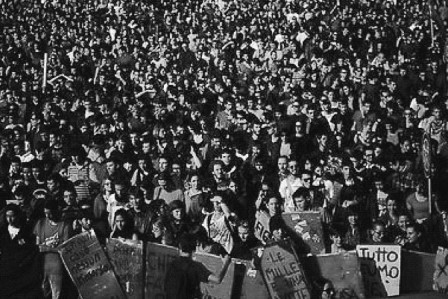
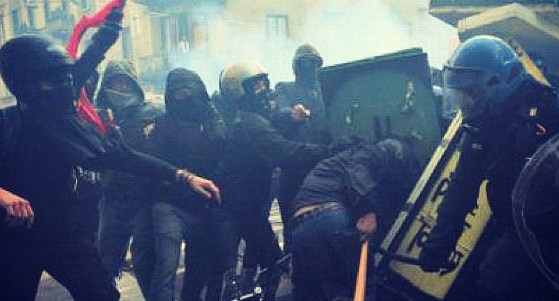
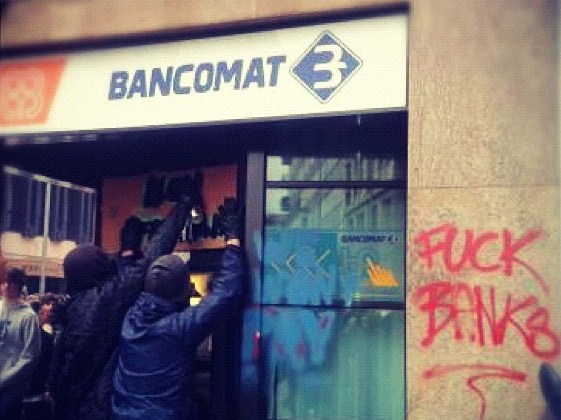
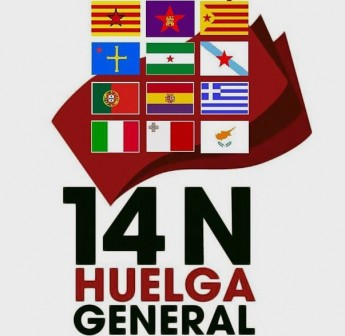
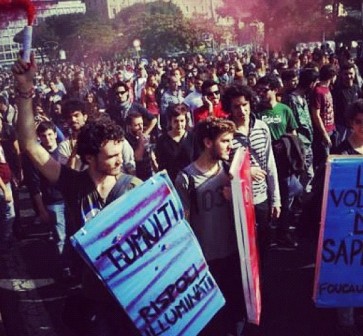
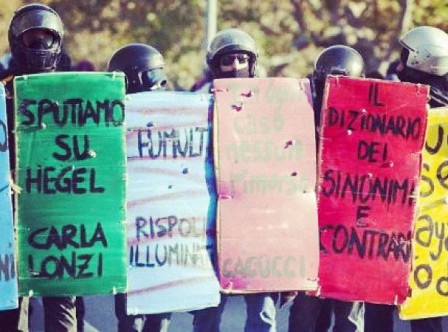











One Response to Spain’s Sado-Monetarism: Will It Lead to Revolution? – Part II
You must be logged in to post a comment Login